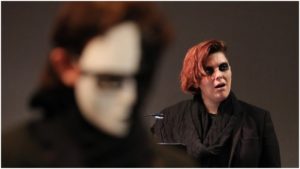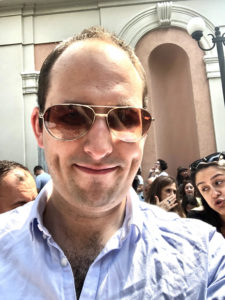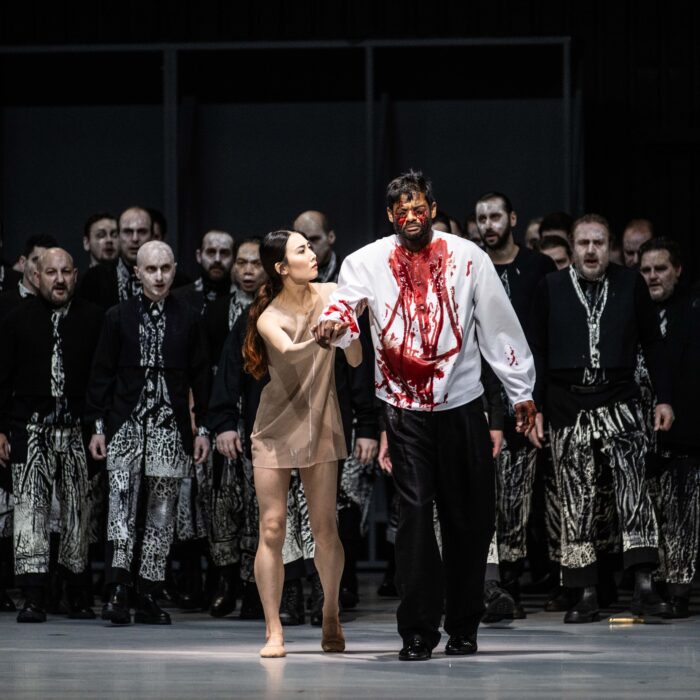
Tête à Tête Festival 2020 Review: We Sing/I Sang
Leo Doulton’s improvised Operatic Dystopia is Direct & Affecting
By Benjamin PooreThe Tête à Tête festival in Marylebone’s Cockpit Theatre is the heart of experimental and fringe opera performance in London.
Orchestras and companies have lately been rushing, since lockdown loosened, to be “first” to come back – first performance of a symphony to a live audience (Aurora Orchestra at the beginning of September); first performance of an opera in London (Holst’s ‘Sāvitri’ with Hampstead Garden opera in August); first opera performed in an indoor theatre with an audience.
These kinds of claims shouldn’t be taken too seriously – they’re just a marketing reflex, ultimately – but Tête à Tête’s festival does make a strong claim to that final first, which opened last week and will see the performance of over 50 new works – an extraordinary number, given the context, and a sure sign that there is a vibrant and industrious fringe opera scene keen to make the art form new.
Subjects are dizzying and exploratory: nuclear war, geology, technology, WW1 pension tribunals for woman, and Confucian philosophy, to name only a cursory selection from the program. If lockdown has prompted some reconsideration of opera’s normal way of doing business, then one of its key realizations must be that we need new work more than ever, and that new work should be an absolutely central plank of programming and opera-going.
It’s also an opportunity for anyone interested in opera to think about its essentials, which are articulated with remarkable clarity in Leo Doulton’s semi-improvised “We Sing/I Sang.” It’s a work that draws from many cultural sources, feeling both archaic in its ritual simplicity, its feeling of mysterious invocation, and contemporary in its incorporation of audience responses into the structure and action; it has also been designed for an interactive broadcast online.
‘The Mind’ Faces ‘The Crisis’
“We Sing/I Sang” is, audience participation notwithstanding, performed by three figures: viola of Hannah Gardiner, improvised dance from Leo Doulton, and vocals from CN Lester, who alongside being a singer-songwriter of considerable originality is an important trans activist and thinker. Lester sings “the Mind,” a kind of aggregate consciousness that travels across the stars, a repository for the collective memories and experiences of a civilization laid to waste by an ominous “Crisis.”
Lester clicks us through a kind of apocalyptic PowerPoint, echoing what we might think of as the bare bones of a three-act structure familiar to opera audiences: “The Crisis Consumed Our Homeworld Within Weeks;” “The Mind does not care about the Crisis now;” “The Mind is moderately agitated.” Reflections on these moods form the bulk of the text, and offer moments of emotional breakout in myriad forms – nostalgia, anger, betrayal, amongst others.
As the Mind begins to disintegrate, so too do the constituent components of the work – dance, music, text – whose relationships enter greater states of flux. It is a powerful allegory of the challenges of being together, whether as a society or as artists and audiences. In its final sequence, we learn from Mind that “we listened and saw our union could hold”; at the very conclusion of the piece Lester blurs the words I and We, blending and distorting their vowels so that they teeter and trip into each other. It is understated and moving.
Much to Admire
From a musical standpoint – directed by Erika Gundesen – there is much to admire. It is often as if as if opera is being reconstructed from its ruins. Lester just completed a PhD on seventeenth-century Italian singer and composer Barbara Strozzi, which is certainly reflected in their vocal delivery: flashes of Monteverdi and Handelian coloratura peek through; other moments summon the emotional intensity of verismo or the fluttering mad scene from “Lucia di Lammermoor.” Doulton dances with a fan, strangely redolent of “Madama Butterfly,” but also in reference to the Japanese Noh theatre that inspires the work.
Gardiner’s viola has a kind of acidic lyricism, often biting the edge of the instrument’s bridge, sometimes turning to even harsher sounds by playing behind it; there are anxious, skittering moments that deploy the wood of the bow. The instrument is used simply, and offers a stark melancholy, desolate with flashes of tenderness. This is an elemental and intuitive experience, and a reminder of how much can be achieved with the simplest of elements: bodies in motion, an unamplified voice, and four vibrating strings.
In all, this is a truly affecting performance and certainly a memorable way to return to the theater after the past few months of lockdown.



